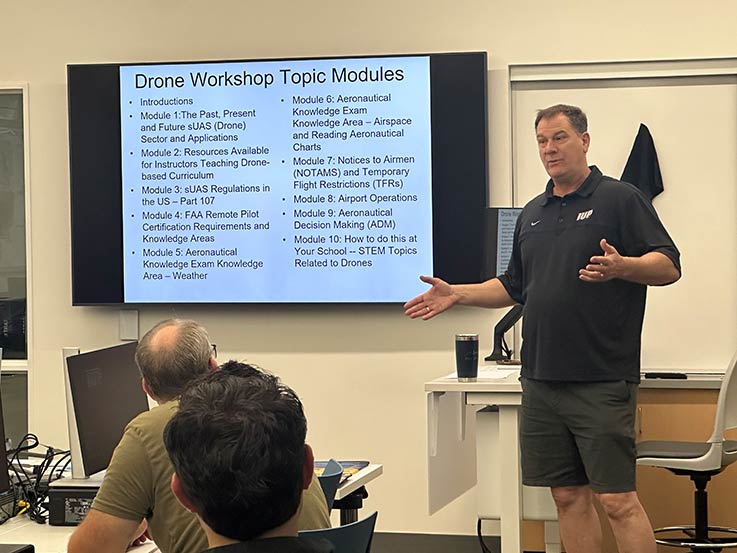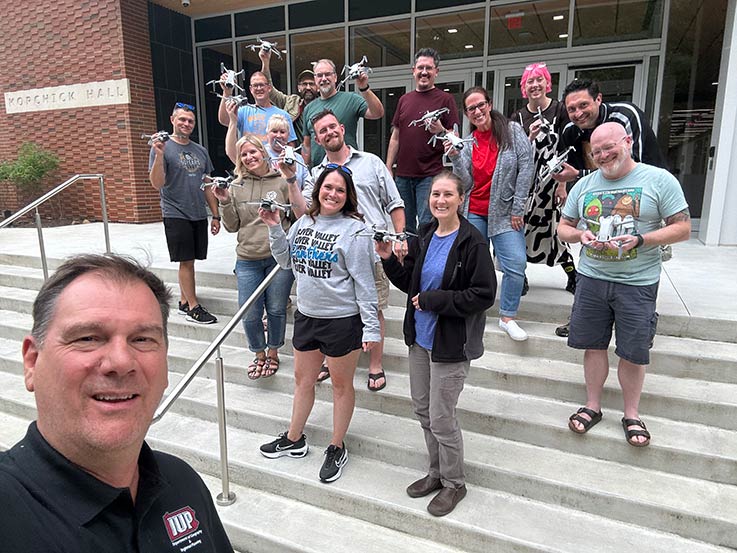With feet firmly on the ground, 15 high school teachers from area high schools also are learning new ways to help their students fly.
In June, Indiana University of Pennsylvania hosted a workshop on uncrewed aircraft (drones) for teachers in eight area high schools who are teaching the aviation curriculum in their schools. The workshop focused on how teachers can integrate drone education into the curriculum. Teachers represented districts in Allegheny, Clearfield, Indiana, and Westmoreland counties.

John Benhart presenting to teachers in the classroom
The workshop was conducted by John Benhart, professor of regional planning in IUP’s Department of Anthropology, Geospatial and Earth Sciences and director of IUP’s Geospatial Intelligence Certificate programs and Unmanned Aircraft Systems Certificate programs. It was cosponsored by IUP and Aerium, based in Johnstown. Aerium is a nonprofit organization formed to cultivate the pipeline between students, educational institutions, and the aviation industry.
Aerium’s development has roots in a multiyear collaboration between Larry Nulton of Nulton Aviation Services, Saint Francis University, the John Murtha Johnstown-Cambria County Airport, local defense leaders, and area elected officials. Benhart serves on the Aerium board of directors.
“It was a very exciting few days, and a great opportunity for the teachers to come together and to learn and exchange ideas about how drone education can be done in Pennsylvania,” Benhart said. “Working with educators in our schools is an important step in connecting the pipeline between secondary school educators, universities, students, and employers to build the aviation workforce of the future.”
“One of the really great things about a teacher workshop is the multiplier effect,” Benhart said. “In total, the teachers attending the workshop estimated that they teach approximately 1,750 students during a typical school year. That is 1,750 students who will learn about career opportunities in aviation, the science and technology that underlies drone systems, and who perhaps will enter learning pathways that lead to an aviation career. We are making progress in meeting this important workforce need,” he said.
Benhart recognized Aerium for its support of the workshop, including providing a drone for each participating teacher to take back to their schools at the conclusion of the workshop.

Group photo of teachers and schools they represent with the drones they received as part of the workshop: John Benhart in foreground; front row, from left, Alissa McNulty (River Valley), Ciara Williams (Marion Center), Michael Lee (United); second row, from left, Matt Yeomans (Marion Center), Jaime Edmonds (Indiana), Tammy Glavich (Indiana), Nicky Findon (Avonworth), AJ Haberkorn (Latrobe); back row, from left, Chris Garritano (Homer Center), Brad Adams (Indiana), Brad Trout (Indiana), Mike Lehman (Indiana), David Sheeran (Indiana), Megan McKillop (Clearfield).
In May, Benhart was an invited panelist for the second annual Aerium Summit at Johnstown’s John Murtha Johnstown-Cambria County Airport. He was also a panelist for a program at the thirty-third annual Showcase for Commerce in Johnstown, where IUP was represented as an exhibitor, providing information on IUP’s Uncrewed Aircraft Systems programs as well as other science programs in the Kopchick College of Natural Sciences and Mathematics.
IUP is the only university in Pennsylvania recognized by the Federal Aviation Administration as an FAA Collegiate Training Institution. Benhart is a GISCI certified GIS professional and an FAA certified remote sUAS (drone) pilot.
In addition to the distinction by the FAA as a Collegiate Training Institution, IUP has received funding from the federal Build Back Better Regional Challenge grant to purchase and test a WingtraOne Gen II hybrid drone for IUP’s Geospatial Intelligence and Unmanned Aircraft Systems Certificate Programs.
IUP has offered an Unmanned Aerial Systems Science and Applications Certificate since 2019. IUP’s Uncrewed Aircraft Systems certificates are designed to prepare students to become FAA-certified remote pilots of small-unmanned aircraft (sUAS, commonly referred to as drones), which are defined by the FAA as aircraft weighing less than 55 pounds.
The FAA’s UAS-CTI program recognizes institutions that prepare students for careers in unmanned aircraft systems. In order to qualify for the initiative, schools must offer a bachelor’s or associate degree in UAS or a degree with a minor, concentration, or certificate in UAS. Schools must provide a curriculum covering various aspects of UAS training, including hands-on flight practice, maintenance, uses, applications, privacy concerns, safety, and federal policies concerning UAS.
Benhart, along with department faculty member Christopher Schaney, developed IUP’s UAS program based on their research interests in high-accuracy mapping and spatial analysis of human-environment interaction.
“IUP was really ahead of the curve in terms of using drones to do mapping in our Geographic Information Science program,” Benhart said. “Offering the training for students to prepare to become FAA-certified remote pilots and to carry out drone flight missions to meet a variety of objectives was a natural outgrowth of our programs in the department,” he said.
To date, about 40 students, mostly from IUP, have completed IUP’s UAS program, which includes 12 credit hours of study.